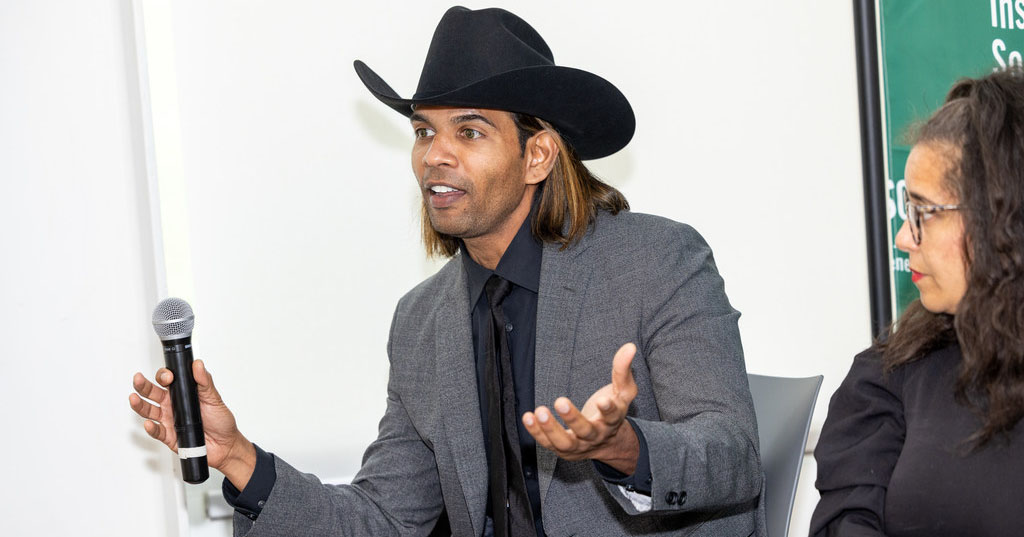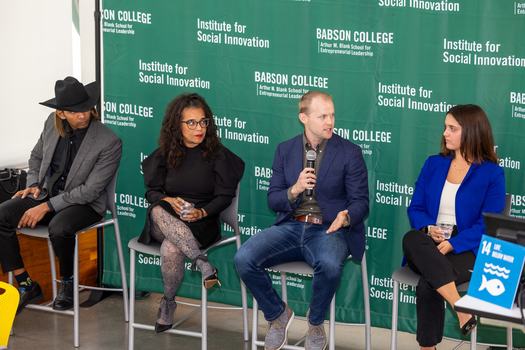Miami Eco-Warrior: Babson MBA Student Talks Blue Economy

Nithesh Wazenn MBA’25 hates bullies.
It’s why, early in his career, he stood up to a staffing company that repeatedly failed to pay back wages to H1-B visa holders like himself. It’s why he jumped in to his first startup. And, it’s why he got involved in fighting climate change.
“I don’t like bullies, and climate change is very closely connected to that. Many people don’t see it, but big companies pollute, and people who can’t fight back have to live with it,” Wazenn said. “These companies dump waste in areas where people can’t fight back. They are polluting the rivers or communities where people don’t have the money for lawsuits, and they know it.”
Wazenn, pursuing his MBA at Babson Miami, is focused on ocean sustainability and the blue economy, which the World Bank estimates could be the largest creator of new jobs and economic growth in the next 20 years.
Wazenn, who also is the business lead for blue economy initiatives at Cognizant, shared his expertise at a recent panel discussion, The Blue Economy Effect, as part of Babson’s Global Entrepreneurship Week. The panel—moderated by Cheryl Kiser, executive director of Babson’s Institute for Social Innovation—also included Ela Gokcigdem ’24 (founder of Bloom and co-founder of MENAeco), Ryan Ross MBA’20 (founder of Local Provisions), and Valerie Stephens (director, marketing and communications at SeaLegacy).
During the discussion and in a following interview, Wazenn shared more thoughts on the rising blue economy, the impact of Babson Miami, and how anyone can dive in and join the fight.

The problem of ocean pollution feels so overwhelming. What can the average person do if they want to help?
“I think you need to ask yourself: Are you trying to make a splash or an impact? If you’re trying to make an impact, then pick one of these five areas: ocean wealth, ocean health, ocean equity, ocean knowledge, or ocean finance. Once you pick one, try to find innovation and research in that area so you can contribute. That way, you learn about it and you contribute, no matter how small or how big it is, you can make a continuous impact on one concentrated effort. Then, you can use that innovation and research to influence policymaking. Find out which legislature needs that data to make the changes that you want to make happen. So, now you’ve got synergy.”
How do you find a niche in battling ocean pollution?
“One, you find what you love. Then, you learn the skill sets to do what you love. And, three and most important, you find a market for what you love, one that’s going to be hot 10 years from now. Then, you start building that skill set now. And then, you’ll find that niche.”
Can you share an example where you’ve seen real impact that boosts ocean sustainability and the economy?
“There has been good progress in bringing sustainable aquaculture to local communities, and it’s been quite successful. Fish beds are highly toxic environments. So, aquaculture companies and fish farmers planted kelp forests around the fish beds. The kelp absorbs all this toxicity, pushing oxygen inside the fish beds and improving the fish’s health. Businesses can implement sensors to prove the health of the fish is improving due to sustainable farming operations, which means they’ve now built a price premium.”
How has Babson Miami helped you further your goals regarding the blue economy?
“I am in the ocean business; over 275 million people in Latin America work in aquaculture, and the ocean’s total contribution to the region’s GDP is $21 billion or more. Babson also has a significant impact footprint in Latin America. Being in Miami helped me build crucial blue economy networks in emerging markets such as Latin America. Babson Miami is not just a location; it is the door to Latin America.”
“I don’t like bullies, and climate change is very closely connected to that. Many people don’t see it, but big companies pollute, and people who can’t fight back have to live with it.”
Nithesh Wazenn MBA’25
How do you envision your role in Miami’s blue economy future?
“Miami is quickly becoming a blue economy hub. Florida’s economy relies heavily on coastal and ocean-related resources, supporting employment, businesses, and tourism. There are many leading research institutes and schools offering oceanography programs in Miami. As much as scientific knowledge has advanced, only a few companies know the significance of leveraging sustainability as a business opportunity for helping discover ideal product profiles.
“My role is to help create awareness among the future Miami business leaders on how to build an approach to creating business opportunities by working with the ocean, not extracting from it, so nature is enriched, and so are the businesses and communities that rely on it. Babson Miami has a unique opportunity to create business leaders with this much-needed but niche skill set.”
Posted in Entrepreneurial Leadership, Insights




